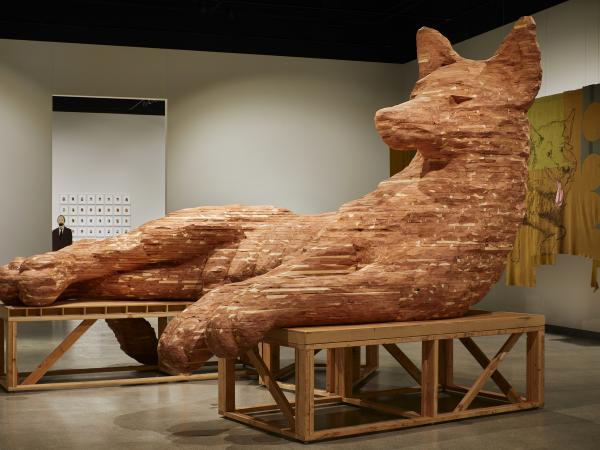About Marie Watt
A citizen of the Seneca Nation, Marie Watt is a nationally known, multidisciplinary artist whose work explores the intersection of history, storytelling and community. Working with textiles (particularly blankets), wood, metal and other materials, Watt has made numerous bodies of work that consider the human relationship to nature. This exhibition features work from her ongoing project “Companion Species,” which investigates the contradictions between the human relationship to wildlife and the stories that we tell about creatures who live in the wilderness. Of “Companion Species: Underbelly,” the 3,800 lb. cedar sculpture in this exhibition, she writes, “I am interested in how an underbelly is both the soft fleshy vulnerable part of a body, but also how it is associated with dark hidden areas. Lately, I have been reflecting on dogs—canis familiaris—as pets, mythological guides, and first teachers. ‘Companion Species’ addresses the reciprocal relationship humans have with canines throughout history, this story is one of ignorance, stewardship and reciprocity.”
Watt holds an MFA in painting and printmaking from Yale University. She attended Willamette University and the Institute of American Indian Arts, and in 2016 she was awarded an honorary doctorate from Willamette University. She has attended residencies at the Skowhegan School of Painting and Sculpture and the Vermont Studio Center, and she has received fellowships and awards from the Joan Mitchell Foundation, Anonymous Was a Woman and the Ford Family Foundation. Selected collections include the Seattle Art Museum, the Whitney Museum of American Art, the Albright-Knox Art Gallery, Yale University Art Gallery, Crystal Bridges Museum of American Art, National Gallery of Canada, the Smithsonian Institution’s National Museum of the American Indian and Renwick Gallery, the Tacoma Art Museum, the Fabric Workshop and Museum, the Denver Art Museum, the Portland Art Museum and the Library of Congress. Watt has received public art commissions from the Tacoma Art Museum, the Bill and Melinda Gates Foundation, the Denver Art Museum and the United States Embassy in Islamabad, Pakistan, through the U.S. State Department’s Art in Embassies program. Recent exhibitions include “Making Knowing: Craft in Art, 1950–2019” at the Whitney Museum of American Art and “Place, Nations, Generations, Beings: 200 Years of Indigenous North American Art” at Yale University Art Gallery.
About Sarah Sentilles
Sarah Sentilles’ most recent book, “Stranger Care: A Memoir of Loving What Isn’t Ours,” was published by Random House in May 2021. The story of Sentilles’ and her husband’s experience as parents in the foster care system, the book is an invitation to reimagine the idea of family and what it means to love. Throughout the book, Sentilles offers readers glimpses of kinship and family structures in the natural world, among trees, birds, fish and more, creating opportunities for rethinking the human act of kinship.
Sentilles is a writer, teacher, critical theorist, scholar of religion and author of many books, including “Draw Your Weapons,” which won the 2018 PEN Award for Creative Nonfiction. Her writing has appeared in The New York Times, The New Yorker, Oprah Magazine, Ms., Religion Dispatches, Oregon ArtsWatch and the Los Angeles Review of Books, among other publications. She’s had residencies at Hedgebrook and Yaddo. She earned a bachelor's degree at Yale and master's and doctoral degrees at Harvard. She is the co-founder of the Alliance of Idaho, which works to protect the human rights of immigrants by engaging in education, outreach and advocacy at local, state and national levels.
At the core of her scholarship, writing and activism is a commitment to investigating the roles language, images and practices play in oppression, violence, social transformation and justice movements. She has taught at Pacific Northwest College of Art, Portland State University, California State University Channel Islands and Willamette University, where she was the Mark and Melody Teppola Presidential Distinguished Visiting Professor. She teaches writing workshops and works one-on-one with clients to help support their art, writing and creativity.
